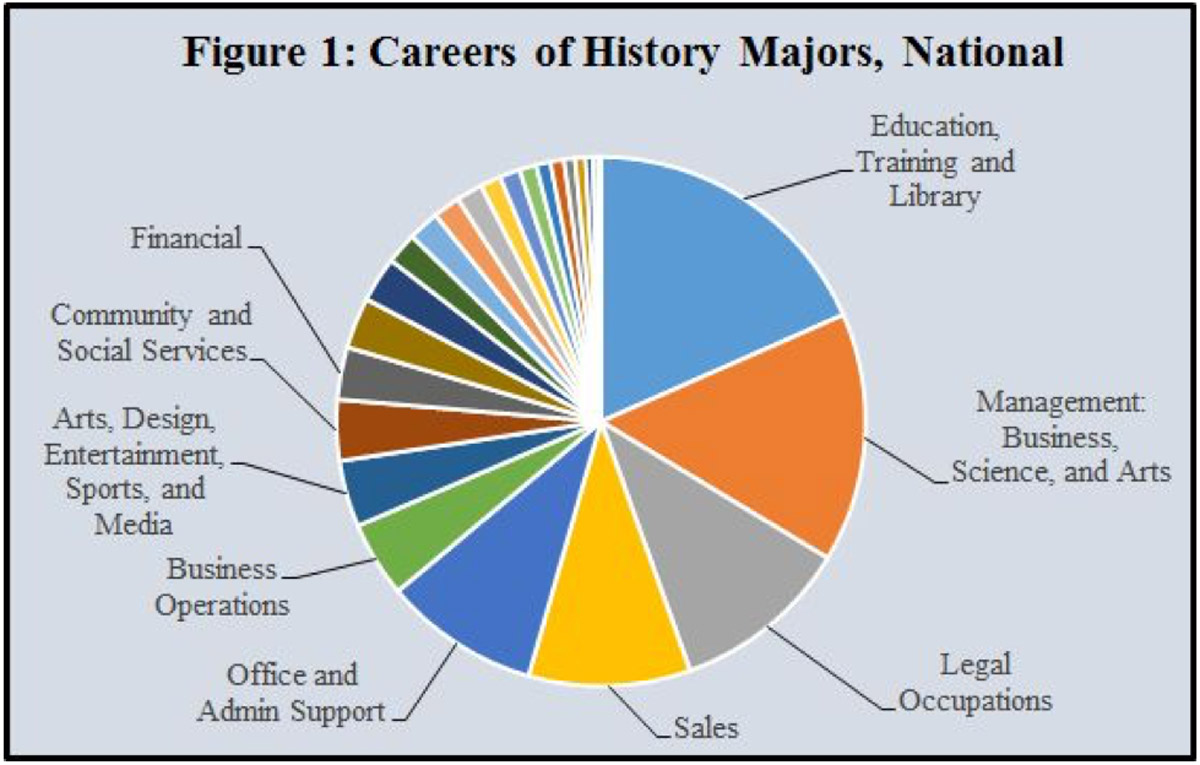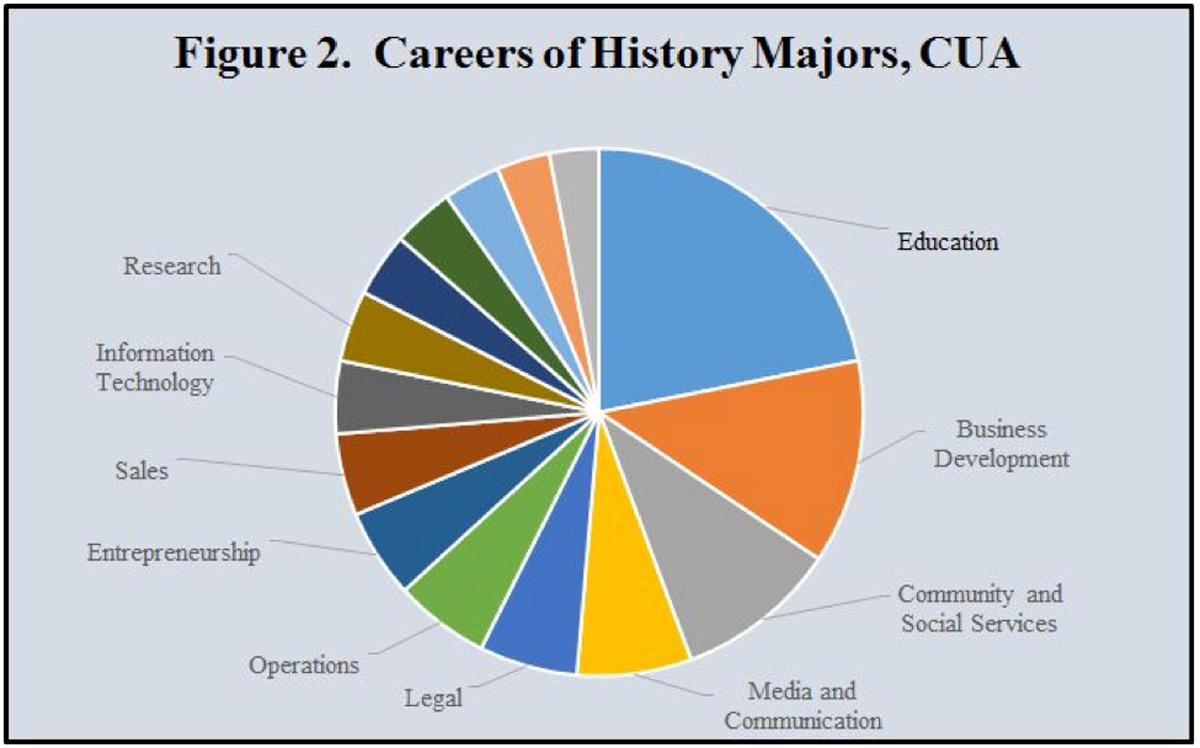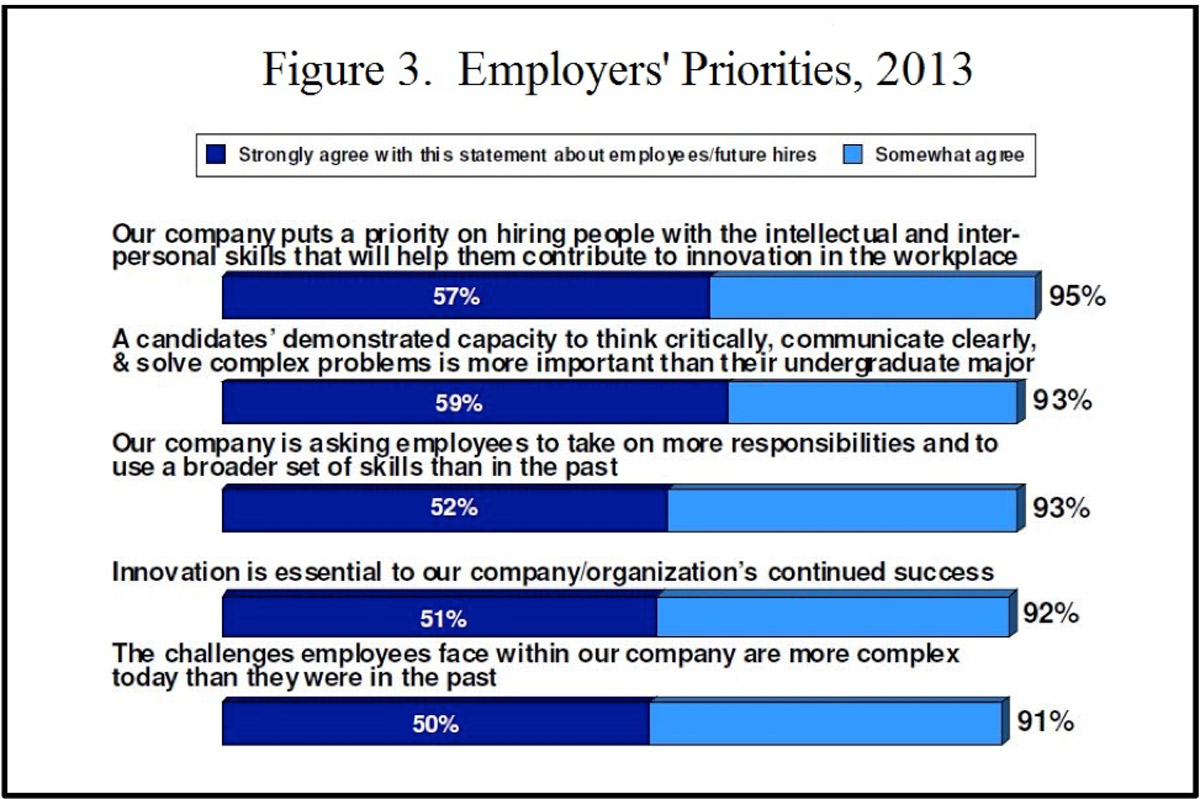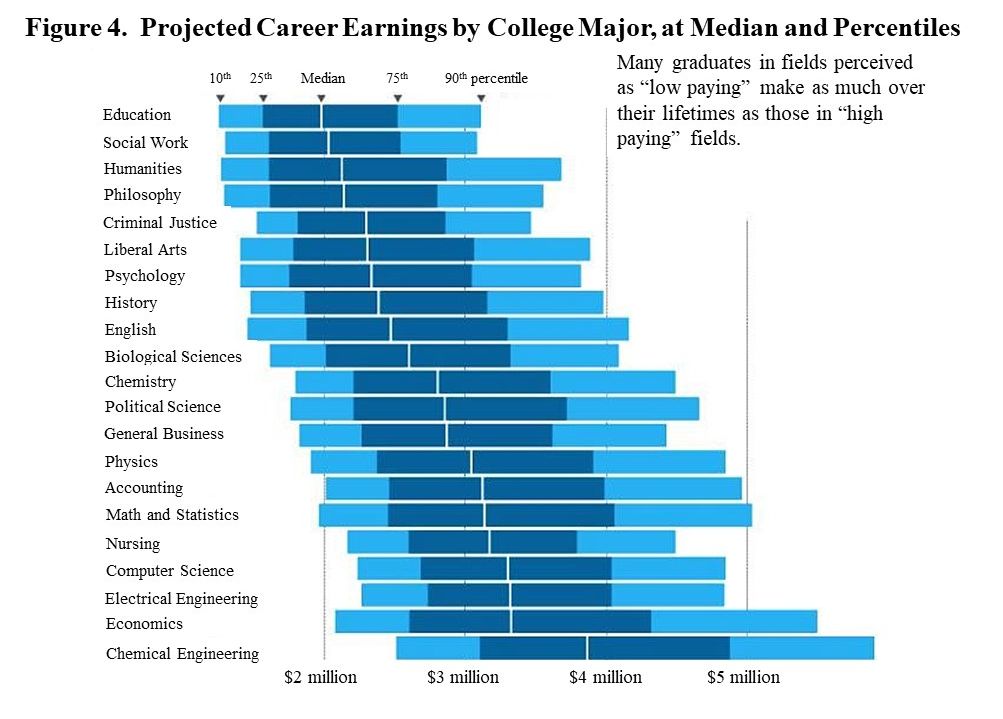So, what are you going to do with that major?
Some – but only some – history majors go on to professional careers whose focus is directly related to history. These include secondary school teachers and university professors of history, librarians and archivists, or museum curators and historians in the public sector.
But most do not. The majority of history majors end up in business, media, law, or other professional sectors. Figure 1 (below) demonstrates this on a national scale (from U.S. Census Bureau, American Community Survey data – for sources for this and the following figures, see citations at the bottom of this page).

The career paths of history majors from The Catholic University of America are very similar (Figure 2 – see also below under “Useful Links” for similar studies from Vanderbilt, Northwestern, and Kansas).

Evidence shows that for history majors (as for majors in other liberal arts subjects), the path from degree to career is not quite so linear as for pre-professional degree-seekers, but the journey can be especially rewarding.
What advantages might history majors have in business or media?
It’s a safe prediction that few current college students will enter one job and stay in it for their entire career spans, and even safer that the very nature of most work will continue to change from graduation to retirement in coming decades. Employers in all sectors look for critical thinkers, clear communicators, and adaptability – in fact, the aptitudes that studying history most directly cultivates. Studies show that the choice of undergraduate major is less important in many professional sectors, and its significance shrinks further into one’s career, in relation to these core aptitudes. Figure 3 summarizes results of a recent survey of employers on precisely this point.
The non-linear nature of history majors’ degree-to-career paths does put a premium upon seeking internships and work experience in relevant sectors, and that in turn means thinking about careers earlier than pre-professional majors – for further discussion of this point see “Career Planning” and “Entering the Job Market”, below under “Useful Links”.

College degrees are expensive: in time, commitment, and effort as well as financially. Nobody considering college-related choices should feel apologetic for asking about the financial consequences of those choices.
Fortunately, there is a great deal of information easily available these days about the relationships among college degree, profession, and salaries. Figure 4 summarizes a recent projection of lifetime earnings by major, graphing median and various percentile points for each. This underscores that while median lifetime earnings vary by major, the range of projected earnings by major also varies: put another way, those who major in history and are slightly above the median for that major are on a par with STEM or business majors who are at median for their majors. History (and other liberal arts) stack up (literally) in very comparable ways alongside professional and technical degree programs.

Our conclusion? If you are passionate about history, then pursue a major in it. It builds the foundation for multiple career paths. Be mindful, however, of the non-linear nature of history majors’ career arcs, and seek out internships and apprenticeships that offer practical experience along the way to graduation. (Washington, D.C. is full of these possibilities!) If you imagine yourself eventually working in a field that might benefit from multiple skillsets, factor that into your course selection. Take a course or two in economics or entrepreneurship, or digital design, and perhaps supplement those with a new language or a study-abroad program to increase your comprehension of other cultures.
Where can you go in history?
Almost anywhere!
Useful Links: Careers for History Majors
“History Majors in the Job Market”, Vanderbilt University
https://as.vanderbilt.edu/history/undergraduate/job.php
“Careers for History Majors”, Northwestern University
http://www.history.northwestern.edu/undergraduate/careers/
“Careers for History Majors”, University of Kansas
https://history.ku.edu/careers
“Career Planning as an Undergraduate in History”, American Historical Association
http://blog.historians.org/2015/06/ba-in-history-career-planning/
“Entering the Job Market with a B.A. in History”, American Historical Association
http://blog.historians.org/2015/05/entering-job-market-ba-in-history/
James Grossman, “History isn’t a ‘useless’ major. It teaches critical thinking, something America needs plenty more of”, Los Angeles Times, May 30 2016
http://www.latimes.com/opinion/op-ed/la-oe-grossman-history-major-in-decline-20160525-snap-story.html
Katherine Brooks, “Why Major in History?”, Psychology Today, August 5 2012
https://www.psychologytoday.com/blog/career-transitions/201208/why-major-in-history
Sources
For more on the core competencies of history study, see American Historical Association, “AHA History Tuning Project: 2016 History Discipline Core”, available at
https://www.historians.org/teaching-and-learning/tuning-the-history-discipline/2016-history-discipline-core
Figure 1: National data from U.S. Census Bureau, American Community Survey (ACS) 2010-2014 five-year Public Use Microdata Sample (PUMS).
Source: Paul Sturtevant, “History Is Not a Useless Major: Fighting Myths with Data”, American Historical Association Perspectives, April 2017, available at
https://www.historians.org/publications-and-directories/perspectives-on-history/april-2017/history-is-not-a-useless-major-fighting-myths-with-data
Figure 2: Data for Catholic University of America alumni, from LinkedIn
Self-reported career sectors (by LinkedIn’s categories) of CUA alumni
Figure 3: Survey of 318 employers, 2013, commissioned by the Association of American Colleges and Universities, reported in It Takes More than a Major: Employer Priorities for College Learning and Student Success (Hart Research Associates, 2013), available at
http://www.aacu.org/sites/default/files/files/LEAP/2013_EmployerSurvey.pdf
Figure 4: Graphic adapted from Jeffrey J. Selingo, “Six Myths About Choosing a College Major”, New York Times, November 3, 2017 (by kind permission of the author), citing data from research by Professor Doug Webber, Department of Economics, Temple University: https://mobile.nytimes.com/2017/11/03/education/edlife/choosing-a-college-major.html
